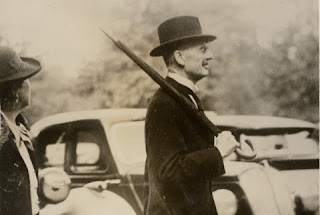Eighty years ago, Chamberlain touts umbrella diplomacy, as Hitler wields rather more effective weapons
Neville Chamberlain set out
his latest thoughts on policy to the unchallenging
audience of the Conservative Women’s Associations. He was able to draw laughs with a reference to his
taking the “old umbrella around again”, promoting his self-image as Europe’s
travelling peace-maker, armed with his trusty “defensive weapon.” He was
clearly unaware that Hitler had developed a violent dislike of the bourgeois, democratic “umbrella
men” who sought ineffectually to restrain him, Chamberlain above all. Nothing in Chamberlain's speech was likely to change Hitler's belief that he had fully got the measure of the British prime minister. Chamberlain assured his
listeners that measures such as the introduction of conscription were aimed at
protecting Britain from attack, and nothing more menacing than that. He hoped that the Danzig issue could be settled by
discussion and the closest he got to a threat was to state that if Germany attempted
unilateral measures, this would start “a general conflagration in which this
country would be involved.” The German press castigated the speech as an encouragement
to the Poles to become even more intransigent. More insidiously, German
comments came close to echoing the reaction to Rab Butler’s House of Commons
speech (“Runciman in sight”) by focusing on Chamberlain’s manifest preference
for a negotiated settlement.
The British government’s
new enthusiasm for extending its protecting hand over the Balkans reached even
further south with the announcement that Britain and Turkey would soon conclude
"a definitive long-term agreement of a reciprocal character in the
interests of their national security". This followed on from guarantees
handed out to Greece and Rumania. It was a nice piece of symbolism, but hardly
likely to affect the plans of either Germany or Italy.
Hitler conducted a widely
publicised tour of inspections of the fortifications being erected along the
border with France: the Westwall to
the Germans or the Siegfried Line to the British. It was a clear statement that
Germany was braced to resist any attack by France, sparked by its guarantee to
Poland or anything else. This was the military counterpart to Germany’s latest
diplomatic advance: the formal pact agreed with Italy. This was due to be
signed in another public demonstration of Axis solidarity, but the German newspapers
were already giving it huge advance publicity.

Comments
Post a Comment